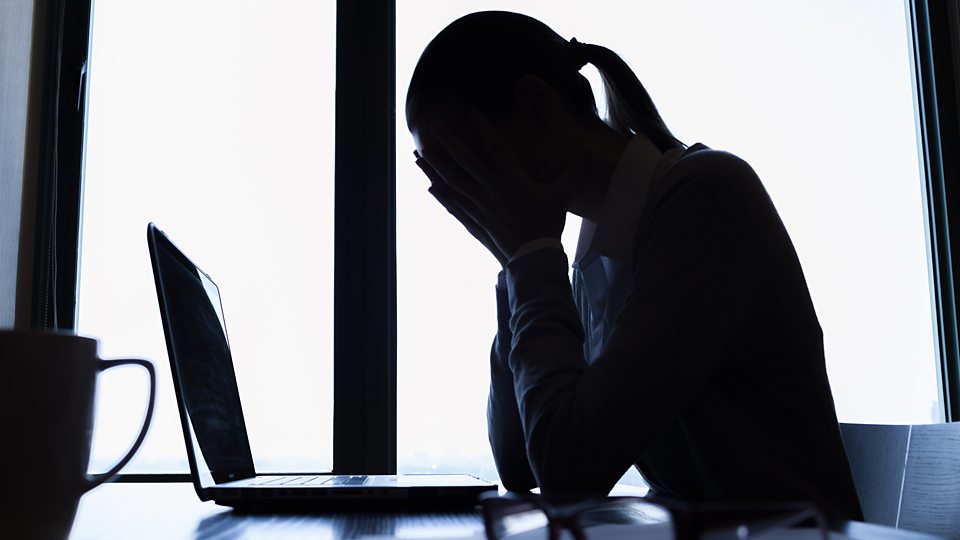你每天看多少次手机?你是不是不断地在看自己在各种社交网站上的账户?研究显示这种行为可能会给我们的心理健康带来负面影响。本期内容探讨网络可能导致人们抑郁的原因。
课文内容
词汇: depression 忧郁,抑郁
Are you a social media addict ? Are you always checking your smartphone to see how many 'likes' you've received for your latest post? Maybe you feel comforted by the notification sound that someone has sent you a message?
Don't worry, you're not alone. We check our phones an average of 150 times a day, and around 30% of the total time spent online is dedicated to social media. Some experts now fear this habit could be damaging our mental health.
This is something particularly afflicting young adults, according to a study from the University of Pittsburgh. It found the more they used social media, the more likely they are to be depressed. In tests, those people who checked social media frequently were 2.7 times more likely to be depressed compared to those who spent most of their time generally surfing the internet, who had just 1.7 times the risk. The study found that exposure to “highly idealised representations of peers on social media elicits feelings of envy and the distorted belief that others lead happier, more successful lives.”
Some of us certainly feel sad when we're ignored on social media sites, or when we see someone else having a better time than us. But depression is a more serious condition and clinical psychologist, Abigael San, recently told the BBC that, "It’s a real issue, and it’s been getting significantly worse over the last 5-6 years. You can get so hooked that it takes you away from your real relationships." However, Abigael does admit that social media is more likely to exacerbate pre-existing issues than directly cause them.
Other research by Glasgow University found that teenagers are affected by the 24-hour demands of their social media accounts. It found that those with higher levels of emotional investment in social media, and who use it at night, were more likely to feel depressed and anxious.
Despite these warning signs, why do some of us continue to keep clicking? Well, I suppose we all want to be liked and we don't want to miss out on a conversation that's taking place online. But we need to know when to switch off our virtual online world and connect with the real world instead.
词汇表
addict 有瘾的人
comforted 得到安慰的
dedicated 专用(于)
mental health 心理健康
afflicting 使…受苦的、苦恼的
exposure 接触
idealised 理想化的
elicit 诱出,引出
envy 羡慕,嫉妒
condition 疾病
hooked 上瘾的,入迷的
exacerbate 使恶化
pre-existing 先已存在的,既往(病史)
emotional investment 情感投入
anxious 焦虑的
virtual online world 虚拟的网络世界
测验与练习
1. 阅读课文并回答问题。
1. Is this true or false? Young people spend on average 150 days a year looking at social media.
2. What phrase did the study use to mean that we think other people are leading happier lives when in reality, they are not?
3. According to research by Glasgow University, using social media at what time of day makes teenagers even more depressed?
4. How often do teenagers feel the need to be look at social media?
5. What word used in the article means 'people of the same age as you or same social position'?
2. 请你在不参考课文的情况下完成下列练习。选择一个意思合适的单词填入句子的空格处。
1. I'm a bit of a coffee ________; I have to have three cups every morning!
adder addicted addict addiction
2. I _________ her piano playing skills. I have had three years of lessons and still can't play a tune.
afflict envy idealise elicit
3. The closure of the factory just _________ the problem of youth unemployment in the area.
exposed comforted elicited exacerbated
4. She looked a bit _________ as she entered the room to take her English exam.
anxious anxiously anxioused anxiosh
5. He has an ________ view of the perfect woman, but to be honest, he's not going to ever meet her!
afflicted idealised anxious virtual
答案
1. 阅读课文并回答问题。
1. Is this true or false? Young people spend on average 150 days a year looking at social media.
False. The report said "w e check our phones an average of 150 times a day."
2. What phrase did the study use to mean that we think other people are leading happier lives when in reality, they are not?
The distorted belief.
3. According to research by Glasgow University, using social media at what time of day makes teenagers even more depressed?
Using it at night.
4. How often do teenagers feel the need to look at social media?
24 hours a day.
5. What word used in the article means 'people of the same age as you or same social position'?
Peers.
2. 请你在不参考课文的情况下完成下列练习。从每个表格中选择一个意思合适的单词填入句子的空格处。
1. I'm a bit of a coffee addict; I have to have three cups every morning!
2. I envy her piano playing skills. I have had three years of lessons and still can't play a tune.
3. The closure of the factory just exacerbated the problem of youth unemployment in the area.
4. She looked a bit anxious as she entered the room to take her English exam.
5. He has an idealised view of the perfect woman, but to be honest, he's not going to ever meet her!


 3342次下载
点击下载
3342次下载
点击下载
 2621次下载 点击下载
2621次下载 点击下载
 4734次下载 点击下载
4734次下载 点击下载
 1854次下载 点击下载
1854次下载 点击下载
 1391次下载 点击下载
1391次下载 点击下载
 1391次下载 点击下载
1391次下载 点击下载











